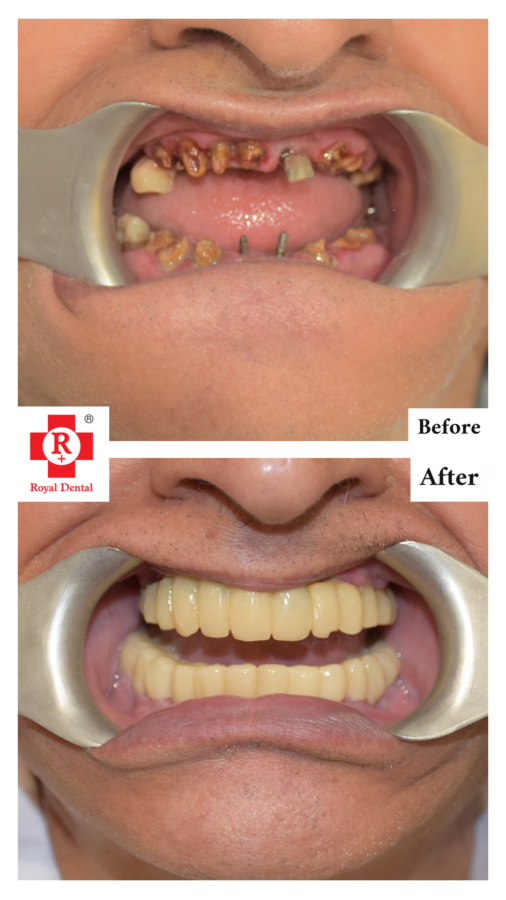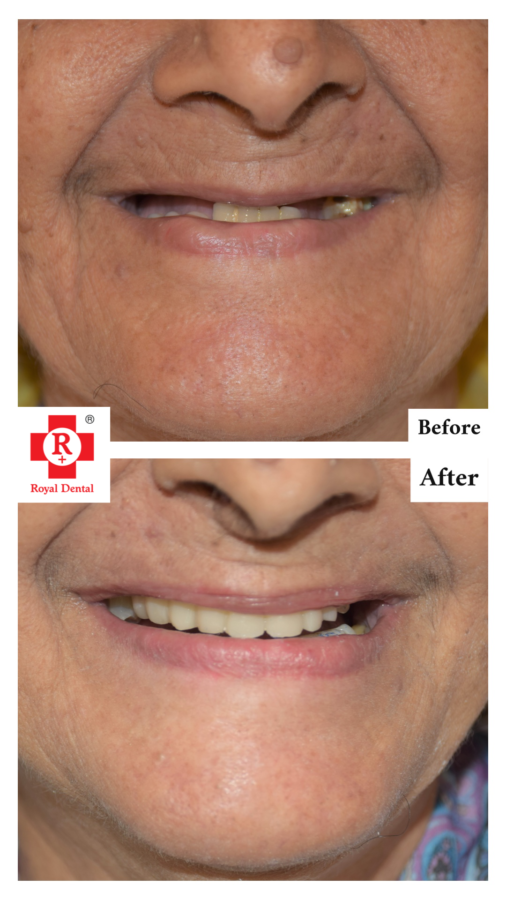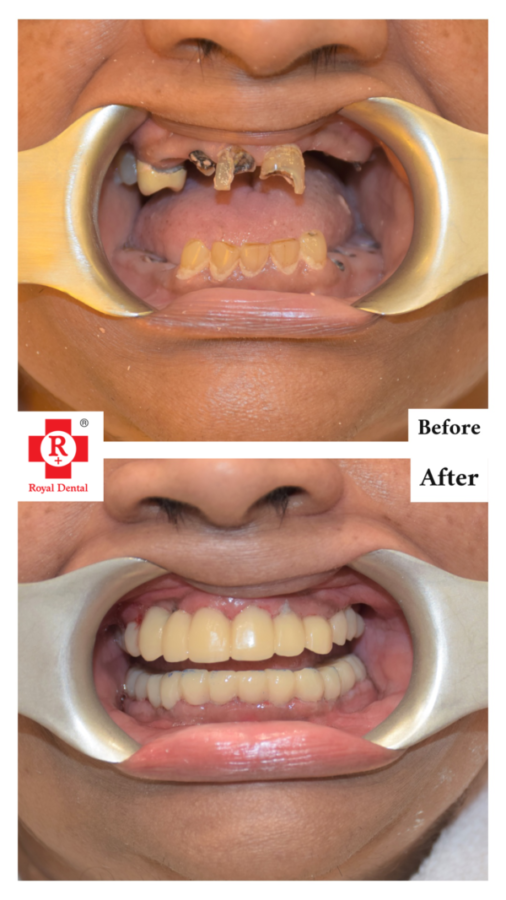Tooth loss can have a significant impact on a person’s quality of life. Not only can it affect the way you speak and eat, but it can also lead to self-consciousness and a lack of confidence. If you’re struggling with tooth loss, it’s essential to know that there are safe and effective solutions available. Royal Dental Clinics offers implant therapy that can help improve your smile and lifestyle. This revolutionary procedure has been changing the lives of patients worldwide, offering a long-lasting and natural-looking alternative to traditional dentures. With dental implant therapy you can enjoy a confident life that will enhance overall well-being without feeling like you had missing teeth. With the latest advancements in technology and materials, dental implant therapy is now more accessible and affordable than ever before.
What is dental implant treatment?
Implant therapy, also known as dental implant therapy, is a dental treatment that involves replacing one or more missing teeth with artificial teeth that are anchored into the jawbone. This is done by surgically placing a small metal post or screw into the jawbone, which acts as the foundation for the replacement tooth or teeth. Once the implant is securely in place, a crown, bridge, or denture is attached to the top of the implant, providing a permanent and stable solution for missing teeth.
Implant therapy has become an increasingly popular alternative to traditional dentures or bridges because it offers several advantages, including improved aesthetics, greater comfort, better speech, and improved ability to eat and chew. Additionally, because the implant is surgically placed into the jawbone, it can help prevent bone loss in the jaw that can occur with missing teeth. However, implant therapy is not suitable for everyone, and a thorough evaluation with a qualified dental professional is necessary to determine if it is the best treatment option for an individual patient.
Benefits of Dental Implant Therapy
Improved Aesthetics: They look and feel like natural teeth. They are custom-designed to match the shape, size, and color of your existing teeth, which means that they blend in seamlessly with your smile.
Improved Comfort: Unlike traditional dentures, they are anchored securely into your jawbone, which means that they are more stable and comfortable to wear. They also do not require adhesives or messy creams to stay in place.
Improved Speech: Missing teeth can affect your ability to speak clearly. They provide a stable foundation for replacement teeth, which can help improve your speech.



Improved Ability to Eat and Chew: They function like natural teeth, which means that you can eat and chew your favorite foods with confidence.
Long-lasting Results: They are designed to be a permanent solution for missing teeth. With proper care, they can last a lifetime.
Preservation of Jawbone: They help to preserve the jawbone by stimulating bone growth. This can prevent the bone loss that can occur with traditional dentures or bridges.
Risks before getting Dental Implants
Dr. Chirag Chamria, Oral & Maxillofacial Surgeon at Royal Dental Clinics, would advise patients to consider the following risks and factors before getting them:
Health Considerations: Dental implant therapy is not suitable for everyone. Patients should have good oral and overall health to be a suitable candidate for dental implants. Patients with uncontrolled diabetes, autoimmune disorders, and certain medications may not be suitable candidates for implant therapy.
Gum Disease: Gum disease is a common oral health condition that affects the gums and bones that support the teeth. If you have gum disease, it may be necessary to treat the condition before undergoing implant therapy.
Bone Loss: Dental implants require adequate bone density to support them. If you have suffered significant bone loss in your jaw, additional procedures, such as bone grafting, may be required to build up the bone density to support the implants.
Infection: Dental implant therapy is a surgical procedure, and as such, there is a risk of infection. Patients must maintain proper oral hygiene practices to reduce the risk of infection.
Dental Implant Procedure
Consultation and Treatment Planning: Your dentist will first evaluate your dental health and determine if you are a good candidate for dental implants. They will also develop a treatment plan customized to your needs and explain the procedure and the expected outcome.
Treatment Planning: Once the patient is deemed a suitable candidate for dental implant therapy, Dr. Chamria will create a treatment plan that outlines the specific steps involved in the procedure.
Implant Placement: During this stage of the procedure, the dentist will place the dental implant into the jawbone. This may involve a minor incision into the gums to expose the jawbone. The implant is then placed into the jawbone and the gums are closed with sutures if needed.
Placement of the Replacement Tooth or Bridge: The final step of the dental implant procedure is the placement of the replacement tooth or bridge. This will be custom-made to match the colour and shape of your natural teeth, ensuring a seamless look and feel. This step can be completed on the same day as implant placement.
Throughout the dental implant procedure, Dr. Chamria will monitor the patient’s progress and provide guidance on proper oral hygiene practices to ensure the best possible outcome. At Royal Dental Clinics, we use advanced technology and techniques to ensure that our patients receive the highest level of care and comfort during their dental implant procedure.
Dental Implant Aftercare and Maintenance
Oral Hygiene: Proper oral hygiene practices, such as brushing twice a day and flossing once a day, are essential to maintaining the health of the implant and the surrounding tissues. Use a soft-bristled toothbrush and non-abrasive toothpaste to brush around the implant, and use dental floss or interdental brushes to clean in between the teeth and implant.
Regular Dental Check-Ups: Regular dental check-ups and cleanings are important to maintain the health of the implant and detect any issues early on. At Royal Dental Clinics, we recommend that patients with dental implants visit us every six months for a check-up and cleaning.
Avoid Hard Foods: Chewing on hard foods, such as ice or hard candy, can damage the implant and surrounding tissues. Avoid chewing on hard foods and opt for softer, more easily chewable foods.
Proper aftercare and maintenance of dental implants are crucial to ensure the longevity of the implants and overall oral health.
Quit Smoking: Smoking can increase the risk of implant failure and can compromise the overall health of the mouth. We recommend that patients quit smoking to improve the longevity of their dental implants and overall health.
Wear a Mouth guard: If you participate in sports or activities that involve contact, we recommend wearing a mouth guard to protect the implant and surrounding teeth.
Monitor Changes: Monitor the implant and surrounding tissues for any changes, such as swelling, redness, or discomfort. If you notice any changes, you can contact Dr. Chamria immediately.
Cost of Dental Implant Treatment
The cost of therapy can vary depending on several factors, including the number of implants needed, the complexity of the procedure, and your location. On average, a single tooth implant can cost between $3,000 and $5,000, while a full set of implants can cost upwards of $50,000.
While therapy can be more expensive than other dental prosthetics, it’s important to consider the long-term benefits of the procedure. They provide a permanent solution for missing or damaged teeth, and they can help to prevent further dental problems down the line.
Frequently Asked Questions
Q: How long do dental implants last?
A: They are designed to last a lifetime with proper care and maintenance. However, implant failure can occur in some cases, and it’s important to discuss the risks and benefits of dental implant therapy with your dentist.
Q: Does getting dental implants hurt?
A: The procedure itself is typically done under local anesthesia, so you should not feel any pain during the procedure. However, some discomfort and swelling may occur during the healing period.
Q: Are dental implants covered by insurance?
A: Some dental insurance plans may cover the cost of therapy, while others may not. It’s important to check with your insurance provider to determine your coverage.
Conclusion
In conclusion, missing teeth shouldn’t stop you from experiencing life to the fullest. Royal Dental’s Implant treatment can help you feel good about yourself again while also boosting your dental health and quality of life. Safe and successful implant treatment is available at Royal Dental Clinics, allowing patients to smile with confidence and eat their favorite foods once again. If you want to be happier and healthier, calling Royal Dental Clinics now is the first step you should take. You’ll be happier and healthier for it.






